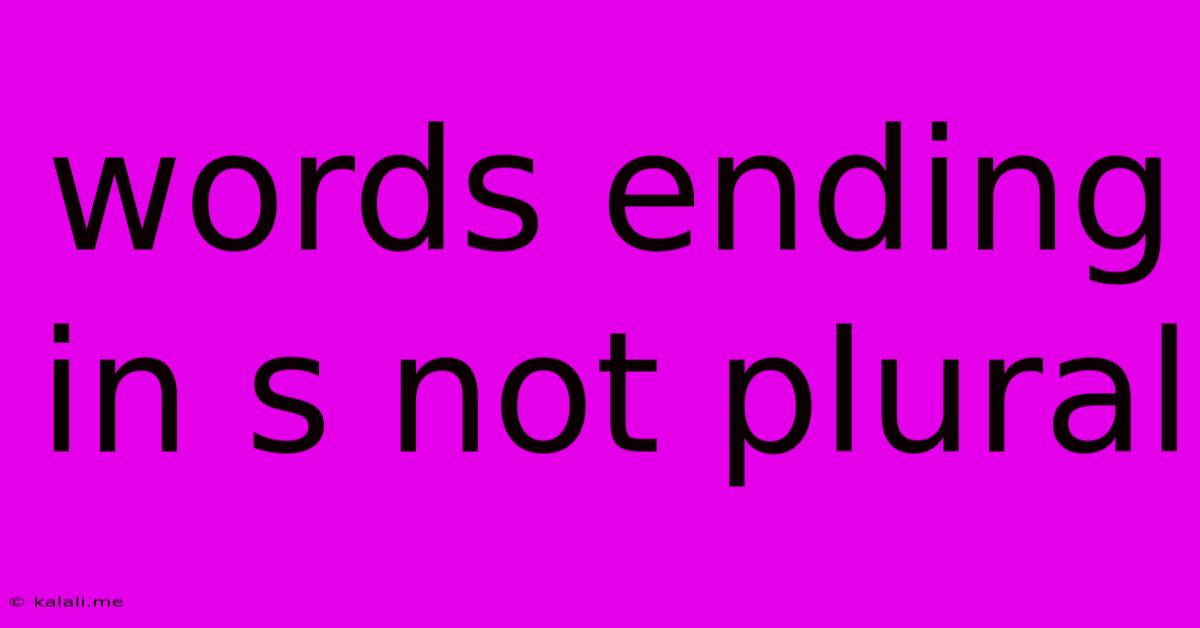Words Ending In S Not Plural
Kalali
May 24, 2025 · 3 min read

Table of Contents
Words Ending in "S" That Aren't Plural: A Comprehensive Guide
Many words in the English language end in "s," but not all of them are plural. This can be confusing, especially for non-native speakers. This article will explore the various categories of words ending in "s" that are not plural, providing examples and clarifying their usage. Understanding these exceptions is crucial for both clear communication and effective writing. This guide will help you avoid common grammatical errors and improve your overall writing skills.
Singular Nouns Ending in "s"
Some nouns are inherently singular, even though they end in "s." These words often have a Greek or Latin origin.
- Physics: The study of matter and energy.
- Mathematics: The science of numbers and their operations.
- Politics: The activities associated with governance.
- Economics: The study of the production, distribution, and consumption of goods and services.
- Ethics: Moral principles that govern a person's behavior or the conducting of an activity.
- Genetics: The study of heredity and variation in living organisms.
- Statistics: The practice or science of collecting and analyzing numerical data.
These words don't take a plural "s" to indicate more than one. You would say "the principles of physics" or "various branches of mathematics," not "physicss" or "mathematicss."
Verbs Ending in "s" (Third-Person Singular)
In the present tense, verbs conjugate differently depending on the subject. The third-person singular (he, she, it) typically adds an "s" to the base verb.
- He runs.
- She sings.
- It rains.
- The dog barks.
- The cat sleeps.
This "s" is a grammatical marker, not an indicator of plurality. The verb itself remains singular.
Proper Nouns Ending in "s"
Many proper nouns (names of people, places, or things) end in "s," and they remain singular.
- Jones: (A surname) "Mr. Jones is a kind man."
- Texas: (A state) "Texas is known for its vast landscapes."
- Paris: (A city) "Paris is the city of lights."
Adding another "s" to make these plural would be incorrect.
Abbreviations and Acronyms Ending in "s"
Some abbreviations and acronyms naturally end in "s," even if they represent singular concepts.
- AIDS: Acquired Immunodeficiency Syndrome.
- LASERS: Light Amplification by Stimulated Emission of Radiation.
While these might seem like plural forms because of the "s," they represent single entities.
Words Ending in "-ness" and "-ship"
Many words indicating a state or quality end in "-ness" or "-ship" and often have an "s" sound within them. While they end with a sibilant sound, they are still considered singular.
- Happiness: A feeling of joy or contentment.
- Sadness: A feeling of sorrow.
- Friendship: A state of being friends.
- Scholarship: Financial aid for education.
These words don't require an added "s" for pluralization; you would say "many instances of happiness," not "happinesses."
Mastering the Nuances of "s" Endings
Understanding the different contexts where words ending in "s" are not plural is crucial for accurate and effective writing. Paying close attention to the grammatical role of the word—noun, verb, proper noun, or abbreviation—will help you correctly identify whether the "s" indicates plurality or serves another grammatical function. By mastering these nuances, you can avoid common grammatical pitfalls and enhance the clarity and precision of your written communication.
Latest Posts
Latest Posts
-
Do You Go Faster At Higher Altitudes
May 24, 2025
-
Can You Bring Matches On A Plane
May 24, 2025
-
How Can They Hear Without A Preacher
May 24, 2025
-
Question Mark Inside Or Outside Quotes
May 24, 2025
-
Do Children Need Id To Fly
May 24, 2025
Related Post
Thank you for visiting our website which covers about Words Ending In S Not Plural . We hope the information provided has been useful to you. Feel free to contact us if you have any questions or need further assistance. See you next time and don't miss to bookmark.